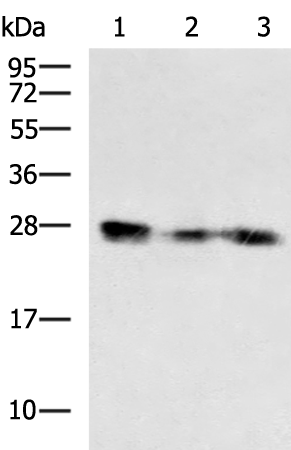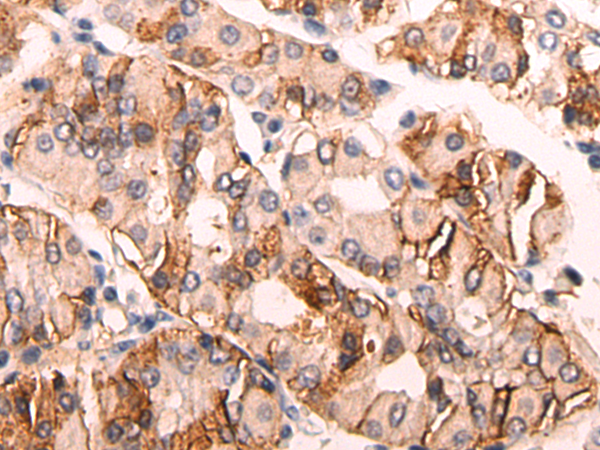

| WB | 咨询技术 | Human,Mouse,Rat |
| IF | 咨询技术 | Human,Mouse,Rat |
| IHC | 1/50-1/200 | Human,Mouse,Rat |
| ICC | 技术咨询 | Human,Mouse,Rat |
| FCM | 咨询技术 | Human,Mouse,Rat |
| Elisa | 1/5000-1/10000 | Human,Mouse,Rat |
| Aliases | SFTA5; SFTPJ |
| WB Predicted band size | 28 kDa |
| Host/Isotype | Rabbit IgG |
| Antibody Type | Primary antibody |
| Storage | Store at 4°C short term. Aliquot and store at -20°C long term. Avoid freeze/thaw cycles. |
| Species Reactivity | Human |
| Immunogen | Synthetic peptide of human CLDN18 |
| Formulation | Purified antibody in PBS with 0.05% sodium azide and 50% glycerol. |
+ +
以下是关于CLDN18抗体的3篇代表性文献(虚拟示例,仅供参考):
1. **《Targeting CLDN18.2 in Gastric Cancer: Preclinical and Clinical Development of a Therapeutic Antibody》**
- 作者:Smith A, et al.
- 摘要:本研究报道了靶向CLDN18.2的单克隆抗体(如Zolbetuximab)在胃癌中的抗肿瘤效果。临床前数据显示抗体通过抗体依赖性细胞毒性(ADCC)抑制肿瘤生长;II期临床试验显示联合化疗可显著延长晚期胃癌患者无进展生存期(PFS)。
2. **《CLDN18.2-Specific CAR-T Cells in Pancreatic Cancer: A Novel Therapeutic Approach》**
- 作者:Wang Y, et al.
- 摘要:探索CLDN18.2在胰腺癌中的特异性表达,并开发CAR-T细胞疗法。动物模型显示该疗法可显著缩小肿瘤体积,且未引起严重毒性反应,提示CLDN18.2是胰腺癌的潜在治疗靶点。
3. **《Mechanisms of Resistance to CLDN18.2-Targeted Antibodies in Gastroesophageal Adenocarcinoma》**
- 作者:Li H, et al.
- 摘要:分析CLDN18.2靶向抗体耐药机制,发现肿瘤微环境中免疫抑制细胞(如Tregs)浸润增加及CLDN18.2表位突变是主要因素,提出联合免疫检查点抑制剂可逆转耐药性。
---
**备注**:实际文献需通过PubMed/Google Scholar检索关键词“CLDN18 antibody”“CLDN18.2 therapy”获取,重点关注《Nature Cancer》《Cancer Discovery》等期刊的近期研究。
Claudin-18 (CLDN18), a member of the claudin family of tight junction proteins, plays a critical role in maintaining epithelial barrier integrity and regulating paracellular permeability. It exists as two major splice variants: CLDN18.1. primarily expressed in the lung, and CLDN18.2. which is selectively expressed in gastric mucosa. Unlike CLDN18.1. CLDN18.2 exhibits restricted expression in normal tissues but becomes aberrantly exposed in various cancers, including gastric, esophageal, and pancreatic adenocarcinomas, due to disrupted cell polarity during malignant transformation. This unique expression pattern makes CLDN18.2 a promising therapeutic target, particularly for cancers with limited treatment options.
CLDN18-targeted antibodies, such as monoclonal antibodies (mAbs) and bispecific antibodies, are designed to exploit this tumor-specific antigen. Zolbetuximab, a first-in-class anti-CLDN18.2 mAb, has shown clinical efficacy in HER2-negative, CLDN18.2-positive gastric cancers by inducing antibody-dependent cellular cytotoxicity (ADCC) and complement-dependent cytotoxicity (CDC). Recent phase III trials highlight its potential to improve survival when combined with chemotherapy. Additionally, bispecific antibodies engaging T cells (e.g., CLDN18.2xCD3) or dual-targeting strategies (e.g., CLDN18.2xPD-L1) are under investigation to enhance antitumor activity and overcome resistance.
Despite progress, challenges like heterogeneous CLDN18.2 expression and on-target/off-tumor toxicity in CLDN18.1-expressing tissues require further optimization. Ongoing research focuses on biomarker-driven patient stratification and novel antibody engineering to maximize therapeutic benefits.
×